News
Bobrisky to face fresh criminal charges as panel indicts four prison officers
Published
6 months agoon
By
Ekwutos Blog
Controversial crossdresser, Idris Okuneye, aka Bobrisky, may face fresh criminal charges over claims that he served his jail term in a private apartment and bribed officials of the Economic and Financial Crimes Commission to drop money laundering charges against him.
Ekwutosblog on Sunday exclusively gathered that a panel set up to investigate the claims recommended that he should face defamation and criminal charges.
Bobrisky was sentenced to six months’ imprisonment on April 12 for abusing the naira. He was released from prison on August 5.
A few weeks after his release, controversial social critic, Martins Otse, aka VeryDarkMan, shared a voice note of a conversation purportedly between Bobrisky and another person, where the crossdresser allegedly stated that he bribed EFCC officers with N15m to drop money laundering charges against him. He also claimed to have bribed officials of the Nigerian Correctional Service to serve his six-month sentence in a private apartment.
The Minister of Interior, Olubunmi Tunji-Ojo, subsequently constituted an investigation panel, chaired by the Permanent Secretary of the ministry, Magdalena Ajani, on September 30, to probe the claims.
The panel, while presenting its report, said there was no evidence that Bobrisky slept outside the Kirikiri Custodial Centre during his six-month sentence.
Details of the report, exclusively obtained by Ekwutosblog on Friday, stated that Bobrisky tarnished the image of the correctional service with false claims.
The panel also asked the Department of State Services to investigate whether, directly or through a proxy, he bribed the EFCC or the correctional service.
If the allegations of bribery by Bobrisky are substantiated, the panel said he should be charged with corrupt practices.
“The Nigerian Correctional Service should file defamation suits against Bobrisky under sections 373-375 of the Criminal Code Act for his false claims about bypassing the prison system, tarnishing the institution’s reputation.
“The DSS should be requested to investigate whether Bobrisky, directly or through a proxy, bribed EFCC or NCoS officials. If substantiated, Bobrisky should face charges under the Corrupt Practices and Other Related Offences Act for bribing public officials,” the report partly read.
The panel also indicted four correctional officers who were recommended for disciplinary action as outlined in the NCoS’s condition of service, civil service, and applicable laws.
One of those recommended for sanctions is a former Controller of Corrections, Ben Rabbi-Freeman.
He was accused of “effecting the transfer of Okuneye Idris Olarenwaju without proper documentation of Form 5 and Form 5A from the Medium-Security Custody Centre to the Maximum-Security Custodial Centre on April 22, 2024, after over four months of the transfer date, and after the inmate had ended his imprisonment term; backdating the transfer documentation in relation to 1a and 1b above.
The Minister of Interior, Olubunmi Tunji-Ojo, subsequently constituted an investigation panel, chaired by the Permanent Secretary of the ministry, Magdalena Ajani, on September 30, to probe the claims.
The panel, while presenting its report, said there was no evidence that Bobrisky slept outside the Kirikiri Custodial Centre during his six-month sentence.
Details of the report, exclusively obtained by Sunday PUNCH on Friday, stated that Bobrisky tarnished the image of the correctional service with false claims.
The panel also asked the Department of State Services to investigate whether, directly or through a proxy, he bribed the EFCC or the correctional service.
If the allegations of bribery by Bobrisky are substantiated, the panel said he should be charged with corrupt practices.
“The Nigerian Correctional Service should file defamation suits against Bobrisky under sections 373-375 of the Criminal Code Act for his false claims about bypassing the prison system, tarnishing the institution’s reputation.
“The DSS should be requested to investigate whether Bobrisky, directly or through a proxy, bribed EFCC or NCoS officials. If substantiated, Bobrisky should face charges under the Corrupt Practices and Other Related Offences Act for bribing public officials,” the report partly read.
The panel also indicted four correctional officers who were recommended for disciplinary action as outlined in the NCoS’s condition of service, civil service, and applicable laws.
One of those recommended for sanctions is a former Controller of Corrections, Ben Rabbi-Freeman.
He was accused of “effecting the transfer of Okuneye Idris Olarenwaju without proper documentation of Form 5 and Form 5A from the Medium-Security Custody Centre to the Maximum-Security Custodial Centre on April 22, 2024, after over four months of the transfer date, and after the inmate had ended his imprisonment term; backdating the transfer documentation in relation to 1a and 1b above.
“Causing the in-charge Ikoyi Custodial Centre, in-charge Medium-Security Custodial Centre, and in-charge Maximum-Security Custodial Centre to sign backdated transfer documents in relation to Okuneye Idris Olarenwaju.”
In addition, the Deputy Controller of Corrections who was in charge of the Kirikiri Medium Security, Micheal Anugwa, who claimed during a parliamentary inquiry that he had not been suspended despite an official order from the Minister of Interior, was recommended for disciplinary action.
He was indicted for receiving Bobrisky into the Medium Security Custodial Centre without the relevant documentation on April 12, 2024, and without the necessary transfer documentation.
“DCC Balogun Sikiru (retd) — formerly in-charge of Maximum Security Custodial Centre for receiving Bobrisky into the Maximum Security Custodial Centre without the relevant documentation on April 22, 2024, and without the necessary transfer documentation, and DCC Sikiru Kamoru Adekunle who was in charge of the Maximum Security Custodial Centre for backdating the transfer documentation in relation to receiving of Okuneye Idris into the Maximum Security Custodial Centre on April 22, 2024, which was a period he was yet to resume as the in-charge of the Maximum Security Custodial Centre.”
The panel further recommended an audit of all inmates and detainees in all custodial centres of the NCoS, their warrants, and other records. It asked that a mechanism be set up to do this and sustain it as an effective oversight weekly.
It demanded “decommercialisation of all welfare and support services to inmates with immediate effect and ensuring that adequate funding and oversight are put in place to ensure the continuation of these. This will also include building sustainable partnerships with civil society organisations (example, with relevant NGOs and professional associations) on some or all of these.”
“Facilitate the effective implementation of non-custodial measures across the entire country to help reduce the number of people in custodial centres by utilising imprisonment only as a last resort,” the report added.
Special facilities in custodial centres
A senior management officer of the NCoS told Ekwutosblog that what people called VIP treatment for certain prisoners was a special facility that had existed for years.
According to the high-ranking officer, custodial centres have different facilities and prisoners’ conditions (health, age, sex) determine which facility they stay in to serve their jail term.
The officer said, “There are different facilities in the custodial centres across the country, and it is not out of place to treat some of the prisoners according to their health conditions, sex, age, and category of the sentence. Importantly, the prison authority also considers human rights and the treatment of the prisoners.
“The case of Bobrisky is an eye-opener for us. The NCoS authority confirmed that he is a woman from the middle upward, while he is a man from the middle downward. We had never had such a person in our custody, and there is no facility for such a situation. He had to be placed in a separate cell so that he wouldn’t be abused. That facility is what he ignorantly called a private apartment.
“Whether VIP or not, the condition of a prisoner will determine the facility he/she is going to stay in. We can’t put a prisoner who has high blood pressure in a cell without enough ventilation.”
Activists make case for crossdressers
Okuneye’s case has sparked debate on human rights and recognition of crossdressers, transgenders, and transsexual individuals in the country’s laws, institutions, and facilities.
Some activists, who spoke with Ekwutosblog, argued that the government and its institutions should be aware of the presence of these individuals and make provisions for them.
The activists believe that sexual orientation is part of the human rights to be respected by the Nigerian government.
An activist, Femi Adeyeye, said the Kirikiri Custodial Centre where Bobrisky served his jail term was not befitting of his sexual orientation.
Adeyeye urged the Federal Government to respect the rights of individuals regardless of their sexual orientation. He also called on the government to provide special facilities for transgender inmates.
“A special cell for transgender persons is a welcome development; it’s something the government should look into,” he stated.
Another activist, Michael Adaramoye, noted that the Nigerian society had not come to terms with the reality of a growing transgender population.
However, Adaramoye said, “While we must recognise the right of individuals to sexual freedom, as long as it does not infringe on the rights of others, we must also be sensitive to the concerns of other members of society.
He advocated the provision of facilities to accommodate transgender individuals in prisons and cells.
“It is important to note that our correctional centres are organised in a way that dehumanises inmates. Under such vicious conditions, it is difficult for any positive character reform to occur. The prison system in Nigeria is in dire need of deep reform and overhaul,” the activist added.
Also, human rights lawyer, Toyin Taiwo-Ojo, said the Federal Government’s position on homosexuality was ambiguous.
“The Nigerian government must re-evaluate Bobrisky’s detention and consider the long-term implications of their decisions,” she concluded.
You may like


BREAKING! India Orders All Pakistani Citizens To Leave Country


State Pension inheritance rule can boost payments by more than £5,000 – see if you qualify


Governorship Candidate of the Young Progressives Party (YPP) in Anambra State, Sir Paul Chukwuma has nominated Chief Uzuegbunam Okagbue, the former Chief Protocol Officer and Deputy Chief of Staff to former Gov. Willie Obiano as his running mate in the November 8, 2025 Anambra governorship election
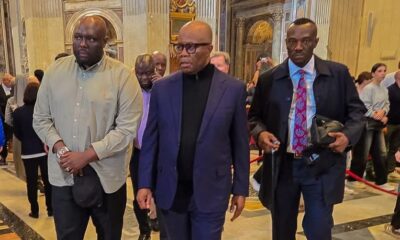

Tinubu’s Delegates Arrives vatican, led delegation to the Lying-in-State of Pope Francis
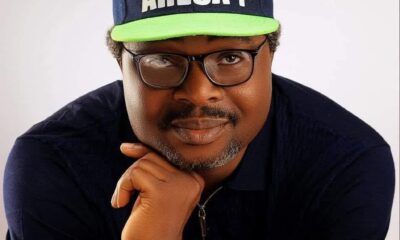

Damagum: Wike’s aide blasts Ugochinyere for asking PDP to expel FCT Minister, Anyanwu
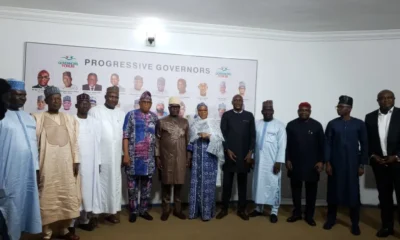

Tinubu’s reforms yielding positive results – APC State commissioners
News
State Pension inheritance rule can boost payments by more than £5,000 – see if you qualify
Published
5 hours agoon
April 25, 2025By
Ekwutos Blog
The additional State Pension was a top-up to the basic State Pension and was replaced by the State Second Pension in 2002
Over half a million people are boosting their State Pension by more than £5,000 annually through inheritance, according to data obtained by a pension provider. A Freedom of Information (FOI) request by pensions mutual Royal London revealed that in the tax year 2023/24, over two million pensioners (approximately 2,027,440) received a payment from an inherited state earnings-related pension scheme (Serps).
This was part of the old State Pension system, which allowed individuals to accumulate entitlement to additional State Pension income. The figures indicate that around 541,760 pensioners were receiving more than £5,000 annually in inherited Serps payments, including 17,460 who received over £10,000.
If a person’s spouse or civil partner passes away, they may be eligible to inherit part of their additional State Pension. This will be paid on top of the surviving spouse’s State Pension when they reach the official retirement age, currently 66.
Surviving spouses and civil partners can potentially inherit up to an annual maximum of approximately £11,356.28 (£218.39 per week) for the 2024/25 tax year. For the 2023/24 tax year, the weekly maximum amount of inherited Serps was slightly lower, at £204.68.
The Department for Work and Pensions (DWP) released this data, which was taken from its quarterly statistical inquiry. According to the figures obtained by Royal London, the average annual inherited Serps payment for 2023/24 was £3,377, reports the Daily Record.
Thanks to the inherited pension boost, some lucky individuals are raking in over £20,000 a year from an enhanced State Pension. The simpler ‘New State Pension‘ was rolled out in April 2016.
Royal London’s consumer finance specialist, Sarah Pennells, remarked: “This data shows how much of a difference inheriting a Serps pension from your husband, wife or civil partner can make. The worry is that, while more than two million people are claiming inherited Serps, others could be missing out.
“Understanding the rules is key to boosting your retirement income.”
Pennells further noted: “As we continue to adapt to the new system introduced in 2016, which focuses on individual entitlements, understanding the legacy of Serps and its relevance for thousands of retirees remains crucial.”
For those unsure about their rights to an inherited Serps pension, Royal London advises getting in touch with the Pension Service to find out exactly what you’re due – detailed guidance can be found on GOV.UK here.
News
BREAKING NEWS: President Bola Ahmed Tinubu has sent a high-powered delegation to Vatican City to attend the burial of His Holiness, Pope Francis, on Saturday, April 26.
Published
7 hours agoon
April 25, 2025By
Ekwutos Blog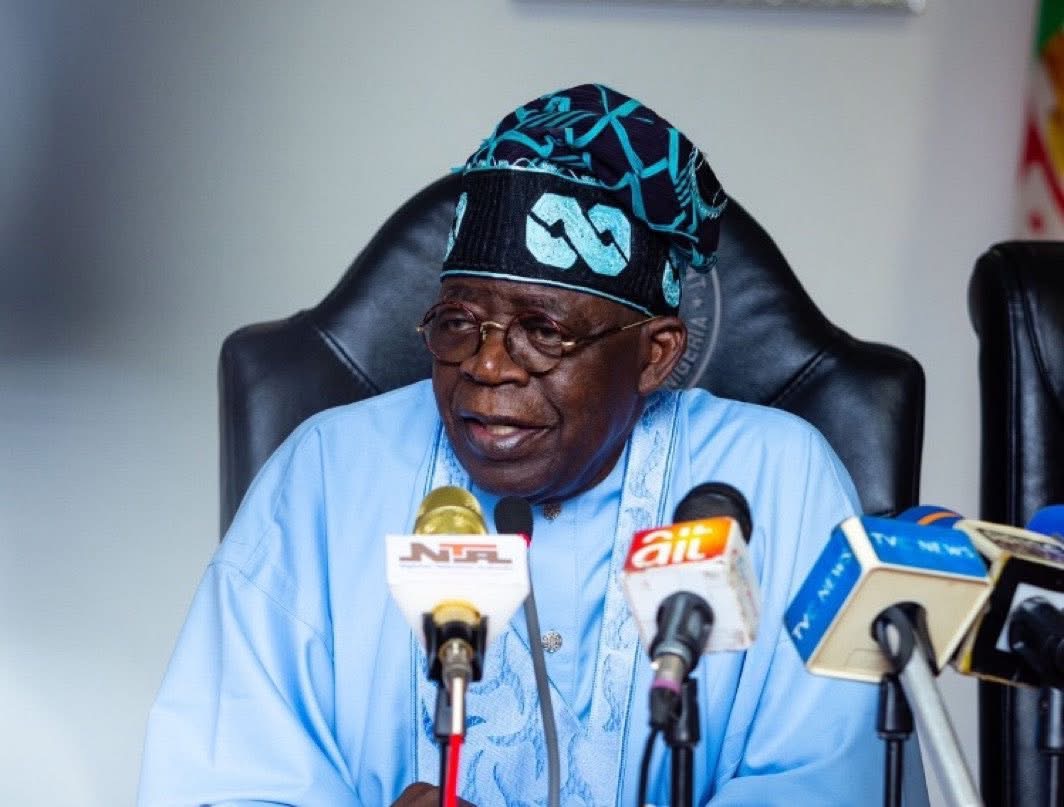
President Bola Ahmed Tinubu has sent a high-powered delegation to Vatican City to attend the burial of His Holiness, Pope Francis, on Saturday, April 26.
Senate President Godswill Akpabio is at the head of the five-member delegation.
Other members of the delegation are the Minister of State, Foreign Affairs, Ambassador Bianca Odumegwu Ojukwu; Archbishop Lucius Iwejuru Ugorji, President of the Catholic Bishops Conference of Nigeria; Archbishop of Sokoto Diocese, Archbishop Matthew Hassan Kukah; and Archbishop of Abuja Diocese, Archbishop Ignatius Ayua Kaigama.
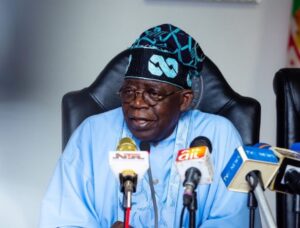
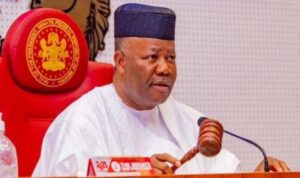
Business
Air Peace set to resume flight operations
Published
15 hours agoon
April 25, 2025By
Ekwutos Blog
Air Peace says it will resume flight operations on Friday following the suspension of strike by the Nigerian Meteorological Agency, NiMeT, workers.
This was contained in a statement by the airline’s Head of Corporate Communications, Ejike Ndiulo, on Thursday night in Lagos.
Ndiulo expressed Air Peace’s gratitude to its customers and the general public for patience, understanding and support throughout the period of the strike.
”Your resilience and trust in our brand mean the world to us.
“We commend the active and decisive intervention of the Minister of Aviation and Aerospace Development, Mr Festus Keyamo (SAN), whose leadership and commitment were pivotal in resolving the impasse and restoring normalcy within the aviation industry,” Ndiulo said.
He noted the minister’s swift engagement with aviation stakeholders, his transparent approach and his dedication to the stability and progress of the aviation sector.
Head of Corporate Communications further stated that Keyamo’s efforts not only facilitated timely resolution of the industrial dispute but also underscored his broader vision for a safer, more efficient and investor-friendly Nigerian aviation industry.
Ndiulo said Air Peace was committed to providing safe, reliable and world-class services.
Ekwutosblog reports that NiMeT workers on Thursday suspended the strike which began on April 22 after the minister’s intervention.
The workers downed tools in protest of alleged poor working conditions, including non-implementation of the 2019 Consequential Adjustment to the National Minimum Wage (affecting at least 30 staff).
They are also demanding a 25/35 per cent salary increase, 40 per cent hardship/peculiar allowance, and annual staff trainings.
The minister had promised to find lasting solutions to the problems.

BREAKING! India Orders All Pakistani Citizens To Leave Country

State Pension inheritance rule can boost payments by more than £5,000 – see if you qualify

Governorship Candidate of the Young Progressives Party (YPP) in Anambra State, Sir Paul Chukwuma has nominated Chief Uzuegbunam Okagbue, the former Chief Protocol Officer and Deputy Chief of Staff to former Gov. Willie Obiano as his running mate in the November 8, 2025 Anambra governorship election
Trending

 Trending6 months ago
Trending6 months agoNYA demands release of ‘abducted’ Imo chairman, preaches good governance
- Business6 months ago
US court acquits Air Peace boss, slams Mayfield $4000 fine

 Politics6 months ago
Politics6 months agoMexico’s new president causes concern just weeks before the US elections
- Entertainment6 months ago
Bobrisky transferred from Immigration to FCID, spends night behind bars
- Entertainment6 months ago
Bobrisky falls ill in police custody, rushed to hospital

 Politics6 months ago
Politics6 months agoRussia bans imports of agro-products from Kazakhstan after refusal to join BRICS

 Politics6 months ago
Politics6 months agoPutin invites 20 world leaders
- Politics1 year ago
Nigerian Senate passes Bill seeking the establishment of the South East Development Commission.

